

The Rediff interview / Malcolm Gray
'It has been alleged that the ICC has no teeth; yes, it is a reasonable criticism'
International Cricket Council chief Malcolm Gray's main business is real estate; but he also dabbles in cricket.
"I have always been connected with cricket. I was a brilliant cricketer; I captained the University fourth XI," he jokes.
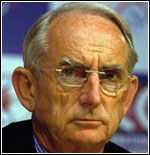 "Obviously," he adds, ''I wasn't greatly talented and I was always mixed up in the
administration of the sport. I have been chairman of the Victorian and
Australian Cricket Boards between 1986 and 1989, and I enjoyed both my stints."
"Obviously," he adds, ''I wasn't greatly talented and I was always mixed up in the
administration of the sport. I have been chairman of the Victorian and
Australian Cricket Boards between 1986 and 1989, and I enjoyed both my stints."
Gray took over the ICC at a time when cricket was swallowed in its worst imbroglio ever -- the match-fixing episode. That was almost a year ago. Now he's attempting to clear the mess.
In an exclusive interview with Cricket Correspondent Faisal Shariff, he discusses the various issues challenging the ICC, and also opens the window to the vision the ICC hopes to pursue to revive the true spirit of the game.
What are the challenges facing the International Cricket Council?
The obvious one is the challenge we have been struggling with since last year; that of corruption in the game. It, to my mind, is an enormous problem; the biggest cricket has ever had, I suspect. We have been quite despondent as time
unfolds; we did not realize that it would be so deep and big as it is. However, the last month or so, the tide is turning a little and we are starting to get back a bit of credibility. I think we are slowly winning the battle.
Was it a shortcoming on the part of the ICC in recognizing the problem earlier than it should have?
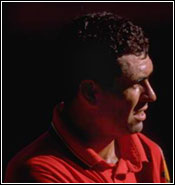 I don't think it was just the ICC's fault. It is normal in life always to blame the government. In cricket, that happened to be the ICC. So, we are always fair game. When something goes wrong, just blame the ICC. I don't think that blame can be just laid on the ICC. I don't think that anybody -- the cricket administrators, players or the paying public -- realized that it was happening to the extent it was. Yes, we at the ICC were slow to act, but even when we began to act, I don't think we acted strongly enough, because we did not understand the full scale of the problem.
I don't think it was just the ICC's fault. It is normal in life always to blame the government. In cricket, that happened to be the ICC. So, we are always fair game. When something goes wrong, just blame the ICC. I don't think that blame can be just laid on the ICC. I don't think that anybody -- the cricket administrators, players or the paying public -- realized that it was happening to the extent it was. Yes, we at the ICC were slow to act, but even when we began to act, I don't think we acted strongly enough, because we did not understand the full scale of the problem.
How should the whole affair have been handled, according to you?
Hindsight is a wonderful thing. But, yes, if you look at it like that, I think we
should have looked at it earlier and nipped it in the bud. I think you will find,
when the story is told, that the match-fixing episode started in the eighties and
flourished in the nineties. It's a pity! But even in the past, if you heard a rumour or a suspicion from someone, you would have hoped that your sporting hero would never have done the wrong thing. But I agree that we should have addressed
the issue earlier.
India banned [Mohammad] Azharuddin and [Ajay] Jadeja; South Africa banned Hansie [Cronje], and [Salim] Malik was banned by Pakistan. Do you think [Shane] Warne and Mark Waugh were let off easily by the ACB [Australian Cricket Board]?
The first incident in Australia -- the Waugh-Warne incident -- was again, in
hindsight, handled very badly by the ACB. I think they did not handle it
severely enough in the first place. Again, they were trying to protect their
heroes and, in that, they kept it quite. You in the press know that when two
people know something, the world eventually knows. It was a wrong judgment call
by the ACB. I think it could have been handled better.
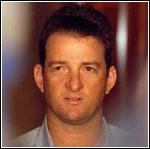 Later, they had the Bob O'Regan inquiry. Barrister Regan carried out an
inquiry, which, to my mind, was an excellent inquiry. And then it went forward to
the ICC Code of Conduct commission, headed by Lord Griffiths, and they dealt with
that.
Later, they had the Bob O'Regan inquiry. Barrister Regan carried out an
inquiry, which, to my mind, was an excellent inquiry. And then it went forward to
the ICC Code of Conduct commission, headed by Lord Griffiths, and they dealt with
that.
There has been some talk, or criticism, that there was a confidential chapter in the report, which was kept confidential. I understand that it had to remain confidential because it named some other people; but there was no substantiation
to it. So, obviously, for both -- legal reasons and for doing the right thing by
people -- that had to remain confidential. Lately, we have seen further allegations
made by the man in India. The ACB investigator, Greg Mellick, is investigating
them and he has carried out investigations and interviewed Mark Waugh in the
presence of the ICC investigator.
But why should that chapter in the Regan report be kept confidential when the
CBI [Central Bureau of Investigation] has submitted its complete report to the public? Is it justified?
Let's get it clear that the confidential chapter was well before the CBI and the
other reports came out. That was some two or three years ago. That investigation
was transparent, the hearings were open and everything was open apart from that
one chapter, which I repeat, for legal reasons and fair play reasons, had to
remain confidential. There was nothing dramatic in it, really.
Come to the current time, I think that all the boards are acting well. The CBI, in my view, has done a great job for cricket worldwide. But what their report showed was the work they had done with regard to the Indian cricketers; and, in doing that work, there were other non-Indian names in that report. Now, it was not the province of the CBI to carry out investigations in people other than
Indians. But various other international cricketers were named; it is now up to
the various cricket boards to carry out their investigations, and it is
happening.
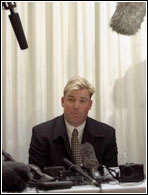 When you say that the Warne-Waugh affair was mismanaged, do you also criticize
the delay in announcing that the duo had been guilty of accepting money from a bookie?
When you say that the Warne-Waugh affair was mismanaged, do you also criticize
the delay in announcing that the duo had been guilty of accepting money from a bookie?
I don't think it is helpful for me to dwell on individual cases, but again, in
hindsight, it would have been better if the Australian Cricket Board had publicly
reported the case earlier.
What are the other issues the ICC faces?
There are various other challenges: one is to build a good organization to take
cricket and the ICC to another professional sports management level. That is necessary if we are going to compete with other sports. And, I also think that we are, in some ways, winning that battle too. We have some very good companies, with
a good international communications firm, to help us with their inputs. We have a
very good partnership with World Sports Group and News Corporation as our
commercial partners. We have other good professional partners in Price WaterHouse
Coopers, PWC, as our financial advisors and a good law firm. Our outside partners
have been put in place after a lot of study over the past 12 months. We will
announce a new chief executive in a short period of time. We will build our
organization from within. The ICC has been under resourced for some time and we
need to build it into a better sports world body.
In an earlier statement, you expressed concern over the umpiring and refereeing
standards. What are your thoughts on the same?
The control of the game on the field is the one area of the game which is not
truly professional. Now, if you look at the players, they are professionals, not
in the amount of money that they earn, but in the way they approach the game;
their dedication and their ability to concentrate to get ahead with their
careers. Their support team -- coach, physio, dietitian, statistician et al -- is
completely professional. It is also appropriate to say that the actual
administrational managers are also professional. In the sports area around the
globe there is a whole raft of good, young and able people handling the
administration efficiently. The one area that really hasnít changed is the
umpiring and the refereeing; and that is not at all being critical about them.
As everyone knows, we have one independent umpire in Tests and no independent
umpires in ODIs. We now believe, after a review by a panel of experts on the
subject, that we should take another leap forward and make it completely
professional -- so we have independent umpires for every international game. That,
of course, comes at a great cost. So what we need to do is provide a career path
for young people to get into umpiring and refereeing, same as in the other
sports. We should do that instead of relying on people who almost fall into
umpiring later on in life. We have got to plot out a career path for the people.
The umpires and referees are under tremendous pressure; sometimes unfair pressure
to the best of their ability. I think, maybe, we haven't given them enough
support.
So, what about the umpires and referees who are currently standing in for games?
Which way will they be headed?
In principle, the ICC has adopted a plan whereby initially the ICC
will contract eight umpires and they will be supported by 25 umpires, what we will
call the emerging umpires. They will not be full-time umpires. Then the
selection process will need to change. It can't be 'hey-you-become-an-umpire, hey-you-get-a-game'.
The whole education of the umpires needs to improve. Fitness, testing, eyesight
and hearing tests etc, all need to be implemented and, similarly, the referees need
to be explained rules. The referees don't have any special training and we need
to look at that completely and redefine their duties.
Our target date to implement this rule is April next year, though some people might want it
pushed forward. The ICC is doing a lot of detailed planning about it.
After the chucking panel was disbanded, what has the ICC decided upon? The
chucking controversy has been going on for long; is it an immediate agenda on
your to-do list?
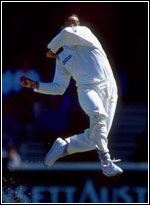 Hopefully, that is another battle that we are winning. I don't want to sound
like everything is going well, but the fact is that there is a lot of hard work going on. There was more than one controversy on the chucking incidents, and because of
what turned out to be some procedures that were less than perfect, the issue
snowballed into something bigger than it was. We have looked at all our
processes to anyone with a suspect action. We have revamped the whole of the
system into a three-stage process and that has being going into effect last year
and it seems to be working well.
Hopefully, that is another battle that we are winning. I don't want to sound
like everything is going well, but the fact is that there is a lot of hard work going on. There was more than one controversy on the chucking incidents, and because of
what turned out to be some procedures that were less than perfect, the issue
snowballed into something bigger than it was. We have looked at all our
processes to anyone with a suspect action. We have revamped the whole of the
system into a three-stage process and that has being going into effect last year
and it seems to be working well.
Some of the players have been sighted and they are going through the first stage of the process.
The procedure will ensure that: a) we won't have the controversies that we had before, which, at times, got rather emotional. And, secondly, anybody with a suspect
action will be treated in a better and fairer way.
'The ICC does not have teeth.' Do you agree with that assessment? Do you accept
that the ICC has not been able to wield its power and get the cricketing nations
together under one umbrella?
You really seem to be attacking me with your questions. That is a very wide
question. Yes, it has been alleged that the ICC has no teeth, and, yes, I think that
it is a reasonable criticism. You have to look how cricket was organized. Cricket was always organized on a
bilateral basis i.e. between the two countries. Say, for example, that India and
England would organize a tour; and they would come together at the ICC table, really, just to have a discussion. The ICC was the Imperial Cricket Conference and it was no more than a conference. Once a year people from all the nations
would come together and share their common problems. It was only in the last decade that it became the International Cricket Council. And some of the powers held by the various nations were centralized.
No individual, no family, no organization or institution likes to give up power. And so the ICC hasn't had power and still doesnít have power in many cases. Now there is a realization that if cricket is to compete with the other sports then we, the countries, have
to allow some of the power which resided with some countries has to go back to
the individual central body. It is a slow process, but it is happening.
What about uniformity of wickets across the globe? You think there should be a
code for the nature of wickets that are prepared, or do you think that the home
advantage should be a privilege?
We haven't looked at that factor at all, I must admit. But there always is a home advantage; ignore the wicket for a minute. There is always an advantage compared
to the visiting team. It is always easy for the home side to play. As for the
pitches, I reckon that any blatant manipulation of wickets for sake of the home side
is quite wrong.
Does racism exist in the ICC? What is your understanding and opinion on the
issue?
Racism is everywhere in the world and in all aspects of life; that is a fact.
And sports is no different; we have to start by acknowledging that there is
racism. As for the ICC, you've got something, which can't really be called
racism, but rather can be termed as nationalism. Cricket is a most unusual sport
as in it is truly a national sport. Unlike tennis, golf, swimming, which are
individual sports, cricket is a team sport. Other team sports are not really
national sports; soccer is all pervading and even though they have the World Cup,
soccer is based on the clubs and the clubs have the power over the sport, all
said and done.
Cricket is one nation playing against another nation, and sometimes that is good. Sports, sometimes, is an outlet for nationalism, as it defuses the surge for nationalism, which, sometimes, can get out of hand.
I think, when you come to the ICC table, all the members are
fighting for their nation, just like the players are fighting for their nation on
the ground. At times, the nationalism issue is at stake; at other times, it can
also be an anti-British attitude. If you look at it, cricket is a British sport,
a British Empire sport; at times, the decision-making processes are made to
get back at the Poms.
That is something that the ICC has to deal with and I, as the president, will have
to deal with. What we can do is come together and make decisions that are good
for cricket.
When Jagmohan Dalmiya was the ICC president, the rights for the next two World
Cup, and the knockouts, were all bundled together and sold off. Can you explain
the wisdom behind such a decision?
I have no comments to make on individual transactions or matters of corruption
that took place before I took over as president. That is not my role; that is the
role of Sir Paul Condon, our investigator.
Why we packaged the World Cups and the knockouts was that it was our view that
we could make two and two equal five or six or, maybe, seven. By putting our
products, the World Cups and the knockouts and some subsidiary tournaments
together, we were wondering if we could make more money by bundling them
together. As we went down through a very rigorous process, it became evident that
our view was correct -- that by putting them together we could receive more than
what we would by selling them individually. That is the background to it; and
after we signed the contract in July we are going pretty well with the
preparations.
What role will the ICC play if a nation refuses to go and play in a particular
country? What did the ICC do when India refused to play Pakistan?
The ICC does not control the foreign affairs of any country. People say that the
ICC should do this and the ICC should do that; well, they can't. On that issue, we
don't have the power and we should not have the power. On such issues, it is the
nation which has the power, and they exercise it the way they deem fit. If a
particular series goes haywire, then it is beyond our control; so we can do nothing
about it. But beyond that we have our hands are tied.
Don't you think that besides globalising the sport around the world, it makes
sense that the ICC pumps in money to save the sport from dying in nations which
already have a great cricketing culture? What has the ICC done to save the
sport in the Caribbean islands?
That is a classical question of any government; of allocation resources. Where
is it best to put the money? Do you try and spend money on nations that need to
develop as a cricketing nation and widen your horizon; or do you take the narrow
path and try and support the elite ones that are strong. There will always be a
debate and it will wax and wan depending on who is at the discussion table.
However, what we have done is that we are trying to meet within the resources
both of the problems. Within the development money, some amount will go towards
the undeveloped cricket nations, but a certain proportion will go to the Test-playing nations. It is a judgment the administrators need to be making. I don't know if there is any one right answer.
You can also read:
Gray areas
Interviews
Mail Cricket Editor